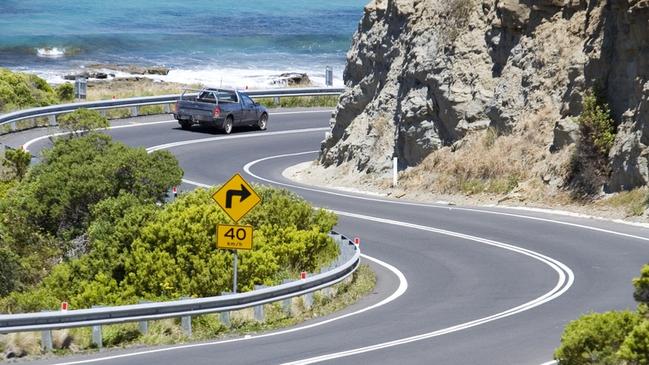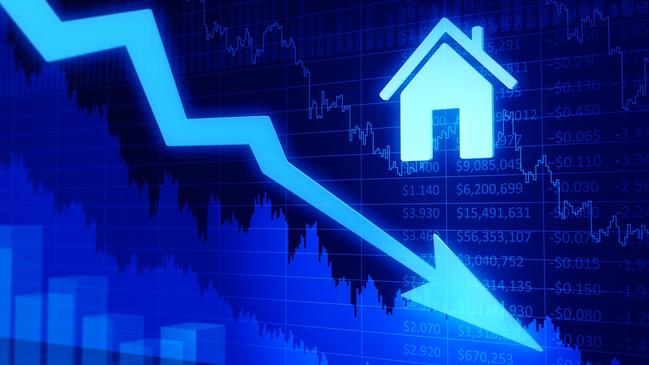The coronavirus could to lead to a financial crisis
Make no bones about it: we are at the start of a very, very steep curve — the Financial Crisis Curve. And when we reach our peak rate of infections it could be financially devastating, writes Barefoot Investor.

Barefoot Investor
Don't miss out on the headlines from Barefoot Investor. Followed categories will be added to My News.
You may think Australia has flattened the curve. You are wrong.
While we obsessively track the curve of COVID-19 infections, there’s another dangerous curve that’s just beginning — the Financial Crisis Curve.
Make no bones about it: we are at the start of a very, very steep curve. And when we reach our peak rate of infections — in, my best guess, five months — it could be financially devastating.
Like all curves, there are three phases. Let me explain.
THE START (NOW)
The other day I asked my boss at Anglicare Financial Counselling how busy we are in light of the coronavirus crisis.
Her response floored me: “Truth be told, we’re no busier than usual … it hasn’t really hit yet.”
Huh?!
It’s true. Given we’re at the start of the curve, a lot of people aren’t feeling many (financial) symptoms … yet.

In fact, many of my harder-up clients are making more money now than before the pandemic hit.
The rate of JobSeeker (formerly Newstart) has been temporarily doubled.
And they’ve been given two $750 cash payments.
And those who’ve been stood down are getting the new JobKeeper payments of $1500 a fortnight (including part-timers).
And almost everyone I speak to is planning on taking $20,000 tax-free from their super over the next few months (despite my protests!).
Even their house payments are cheaper now: Rent is now negotiable. And if they have a mortgage, well, that’s negotiable, too.
The banks have warmly embraced the narrative that they are the “financial doctors” of this economic crisis and they’ve been handing out mortgage pauses — but not interest rate pauses — like Pauline Hanson hands out how-to-vote cards on election day (lots of colourful drawings, not a lot of words).
Of course, there are many people who are stressed and struggling.
It’s just that, as financial counsellors, we’re not seeing them yet (though that may be because they’re locked up in their houses trying to home-school their kids).
Cast your memory back to when ScoMo was weighing up whether he’d go to the footy one last time … that’s the stage of the financial crisis curve we’re at now.
THE CLIMB (APPROACHING SOON)
We’re about to start coming out of lockdown.
Investors have been waiting excitedly for this day for the past month.
Having initially panicked and seen the share market drop by a third last month, they’ve “shaken it off” like Taylor Swift.
The US market has had a swift bounce, soaring 20 per cent on the hope that things will get back to normal in no time.
Well, that’s one theory, which US President Donald Trump certainly wants you to believe (it is an election year after all).
Another theory is that the reopening of the economy will likely be slow, as we all watch out for sniffles … the dreaded second wave of the virus. Continued social distancing and travel restrictions will become the new normal.

Most businesses won’t snap back and re-employ all their workers.
Instead, they’ll likely move gingerly and re-employ just a small number of people.
In the best case, workers will be back to the same hours with no pay increase for a long time. More likely, though, their hours will be reduced … or, in the worst case, they’ll lose their job.
And then comes …
THE PEAK (FIVE MONTHS AWAY)
By now we all know what happens at the peak of the curve.
With the coronavirus, it’s when the hospital system can’t cope.
With a financial crisis, it’s when unemployment peaks — and that’s when the economy falls into a deep recession. But it gets worse: see, this is also when the government has said it will switch off JobKeeper, and cut the JobSeeker supplement back to half.
And with an economy in recession, the banks — our self-proclaimed “financial doctors” — may lose their gentle bedside manner and start flicking off the financial life support for many people and businesses.
Depressed yet?
FLATTENING THE CURVE
OF course, this is just one scenario I’m painting, and it hopefully won’t turn out this bad.
Besides, as we’ve seen with COVID-19, when we collectively listen to scientists we can bend the curve to our advantage.
And I truly hope we do.
Yet my boss at the financial counselling agency reminded me of one thing: “Remember, Scott, before coronavirus, the average wait to see a financial counsellor was three to six months … imagine what it will be like in a few months’ time!”
Tread Your Own Path!
THIS GOVERNMENT SPENDING IS CRAZY!
WAYNE WRITES: This isn’t going to be very popular, but I am going to say it anyway: as someone who has worked my entire life (I’m 67), I’ve never asked for a handout from the government and I am a self-funded retiree. I am very annoyed the government has embarked on this historic and idiotic spending spree. It’s the same old story: the smart savers bail out the no-hopers. I read one economist who suggested we’ll be paying back this debt for the next 20 years. You need to explain this to people. We need to wake up!
BAREFOOT REPLIES: I agree with you: the government’s spending will need to be paid back by future generations, either through higher taxes, or fewer public services, or a combination.
And I also wholeheartedly believe that the government should provide a safety net, not a hammock.
However, let’s get one thing clear: you won’t be paying anything back. You’re feet up in the recliner at noon, nodding off with a tax-free pension, you lucky bugger!
So, as a card-carrying worker with at least 30 years left on my punch card and, as a “high income earner” who will pay a lot of tax over that time, let me tell you how I think about it.
THREE THINGS:
First, I’ve learned not to get emotional about politics.
It’s a waste of energy, and I’d rather channel it into something productive, like financial counselling, or developing a money school program to show the kids of these “no-hopers” (as you callously call them) that they can change their family tree. Now that is something worth getting riled up about!
Second, I’ve learned to compare myself to others and remember how fortunate I am.
I grew up in a caring country community, with loving parents, patient public school teachers and, later, dedicated university lecturers.
Contrast this to many of my financial counselling clients, who grew up in public housing, with abusive and drug-addicted parents, and are trapped in an intergenerational cycle of poverty.
Third, look at the consequences.
If we stop helping out “no-hopers”, we’ll end up looking something like San Francisco.
I was there on a business trip earlier in the year.
It’s a beautiful bayside city, with charming trams and cool designer shops.
It was an amazing place to visit … from the safe confines of our locked Tesla.
That’s because out the front of these luxury shops were scores of homeless people camping out on the sidewalks.
This is not the Australia I want.
Wealth inequality costs society more money in the long run.
It leads to increased crime, overcrowded jails and increased demand for mental health and drug rehabilitation.
And if things get really cooked, it can even lead to demagogues like Donald Trump.
My view? I don’t like government waste, especially when I’m funding it!
Yet honestly Wayne, would you want your kids, or grandkids, living in any other country?
You and I are wealthy people, living in one of the wealthiest countries on Earth.
Honestly, how bloody lucky are we?
If you have a money question, go to barefootinvestor.com and #askbarefoot
The Barefoot Investor holds an Australian Financial Services Licence (302081). This is general advice only. It should not replace individual, independent, personal financial advice.
The Barefoot Investor for Families: The Only Kids’ Money Guide You’ll Ever Need (HarperCollins, $29.99)
Originally published as The coronavirus could to lead to a financial crisis


